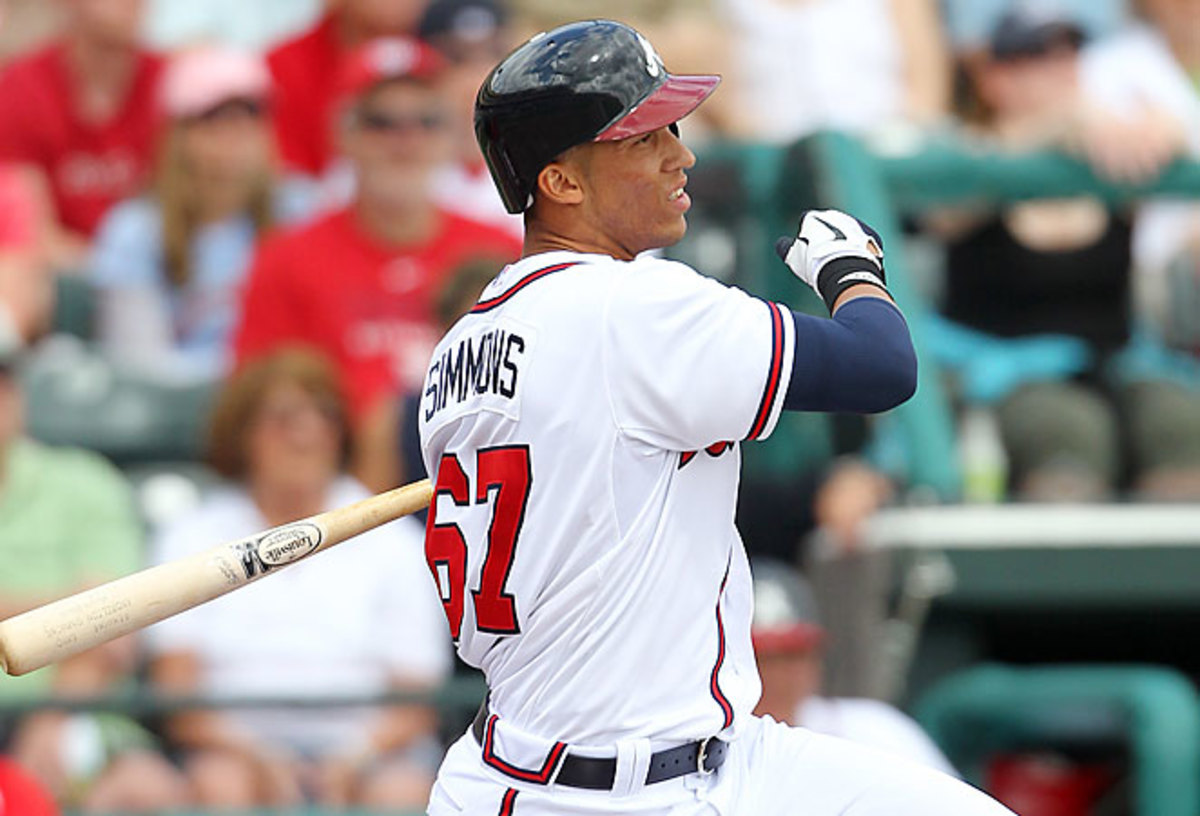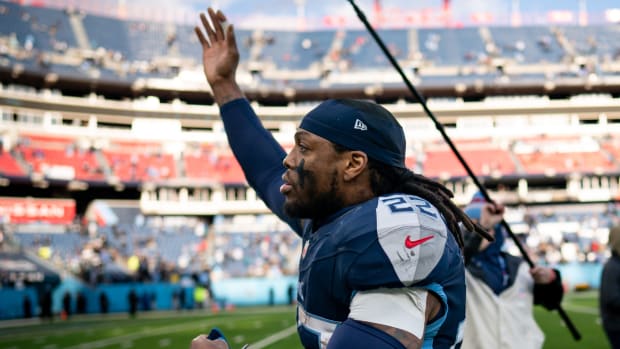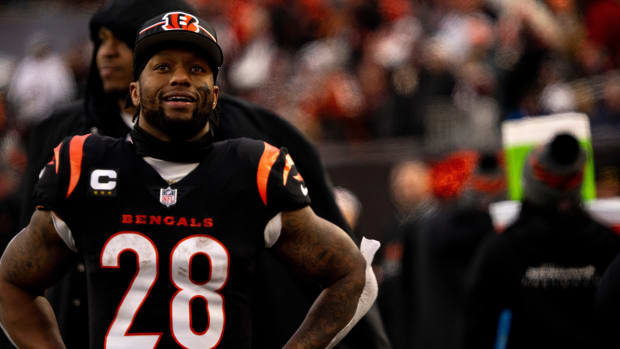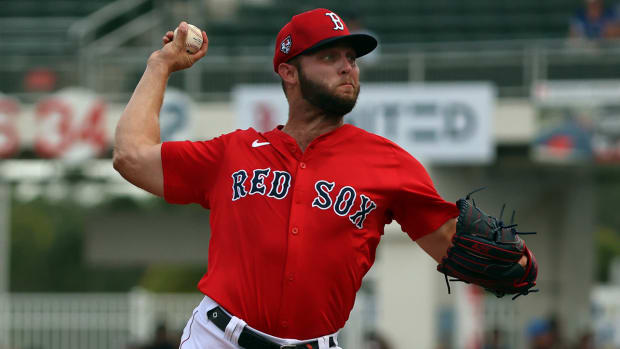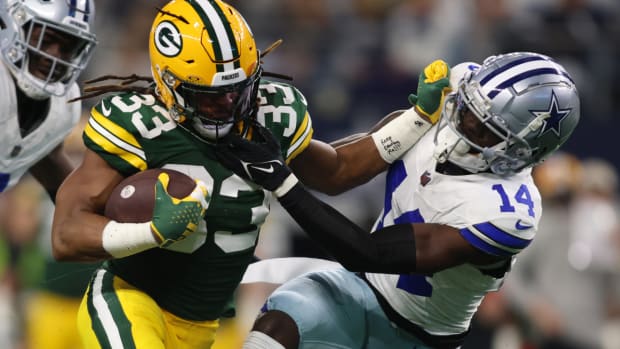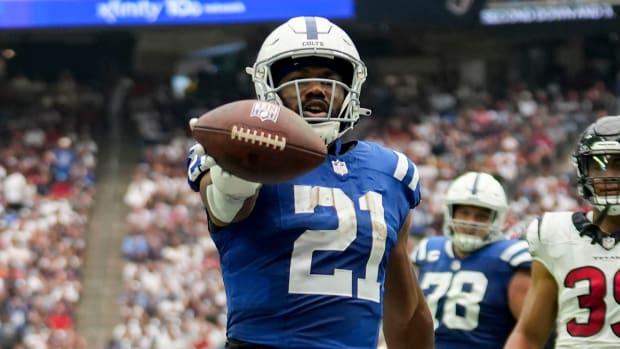Fantasy mailbag: Justin Upton trade's big winner, more

Andrelton Simmons could boost the 17 runs he scored in 2012 with Justin and B.J. Upton in the lineup.
Cliff Welch/Icon SMI
Justin Upton is now an Atlanta Brave and Martin Prado is an Arizona Diamondback, so naturally everything changes for them in fantasy, right? Nope. Very little changes, particularly in regard to the draft position of the pieces in the Braves-Diamondbacks trade.
In fact, Braves shortstop Andrelton Simmons, who didn't get traded for Upton, might be the biggest fantasy winner by not going anywhere. See, the Braves dealt away their leadoff man and now might look to the 23-year-old shortstop to be the replacement. Leading off for a lineup like the Braves' is a lot different than batting one spot ahead of the pitcher.
As for Upton, coming off a disappointing year in Arizona's hitter-friendly park, he is capable of doing just about the same projected damage with the Braves, who figure to protect him a lot better in their beefed-up middle of the order.
For the Diamondbacks, Prado will remain a third baseman/outfielder and a table-setter out in Arizona. Randall Delgado still will have to compete for a No. 5 starter's job with the D'backs. Chris Johnson figures to platoon at third base, while shortstop Nick Ahmed, right-handed Zeke Spruill and first baseman Brandon Drury are still merely long-term prospects on draft day.
Upton remains a top 12 outfielder and Prado roughly a top 12 third baseman. Johnson and Delgado are merely late-round sleepers, while the prospects aren't worth drafting. About all that changes there are the uniforms.
But if Simmons is the leadoff man for the Braves, now we have something significant to consider. The topic of his prospects conveniently starts off this week's edition of the SI.com fantasy mailbag:
If Simmons leads off, where do you rate him in a rotisserie league with his increased run potential?-- Jeff Truesdale, @JTrueser
Simmons could be a poor man's Elvis Andrus out of the box for fantasy owners. Entering his second season, Simmons could hit 100 points more than his weight, while stealing 30-plus bases and helping out significantly in the runs scored category.
Before the deal, we had Simmons listed as merely a fantasy backup. Now, he can be drafted as a starter if he gets the opportunity Andrus had in Texas. Andrus is, after all, ranked as our No. 9 shortstop to target on draft day.
Simmons, assuming the Braves don't choose to lead off with offseason signee B.J. Upton, is a late-round solution for those that miss out on Andrus and all of the other top-flight options at the thin shortstop position. Getting an answer late at a tough position to fill is a beautiful thing.
I'm trying to prepare early for next football season. I can keep three. My studs are: Megatron, Brandon Marshall, Doug Martin, Matt Ryan, Stevan Ridley and Roddy White. Thoughts?-- Jad Griffin, Fort Mill, S.C.
The basic rule of thumb with keepers is to protect those that will be the toughest to draft back. You can go strictly by rankings or average draft position, from the site of your choice. I choose SI.com, smiley face.
Martin and Calvin Johnson will both be among the first-rounders, so they are must keeps. Ridley and Marshall are second-rounders, while Matt Ryan and Roddy White are third-rounders.
You decision on whom you go with as your third pick can be contingent on position, but we would advise sticking to the draft averages here once your keeper deadline arises. The choice right now would be Ridley, who is No. 14 in SI.com's early mock. Marshall (No. 22), Ryan (26) and White (30) figure to be easier to draft back on to your roster; although, we will admit, the sketchy nature of the Pats offense might make Marshall the safer pick when your final decision is due. He is more certain to get a huge piece of his team's offensive pie.
I wanted to get your take on Steven Ridley. How do you think he will do next season? Do you see him getting replaced or getting fewer carries? He has also shown he is not capable of doing well against elite defenses as he gets phased out of certain games (i.e. Baltimore, San Francisco). It seems like he is product of a Pats system that sets him up as a short-yardage, scoring back. Do you think he can repeat the 2012 success in 2013?-- Fahad Munshi, Richmond, Va.
What you just described is just about every running back in fantasy, save for Adrian Peterson and Arian Foster. Assuming you are going to pick a back after the first two overall picks in fantasy, you have to target someone who benefits from a productive offense that gives him ample carries and chances near the goal line.
Is there an offense more potent than the Pats' from which you would rather have a back? You would be hard-pressed to find one. The Pats traditionally score a lot of short touchdowns because Tom Brady keeps the offense so productive week to week -- the AFC Championship notwithstanding.
Ridley, 24, even with Shane Vereen and Brandon Boldin getting carries and goal-line scores, still should be projected to rush for around 1,200 yards and 10 touchdowns. That is still top 10 fantasy running back production, even if it might be a bit inconsistent week to week.
Here are the only backs you should pick ahead of Ridley next fall:
1. Peterson, MIN 2. Foster, HOU 3. Martin, TB 4. Marshawn Lynch, SEA 5. Ray Rice, BAL 6. Alfred Morris, WAS 7. C.J. Spiller, BUF 8. Jamaal Charles, KC 9. LeSean McCoy, PHI
Is Andrew Bogut worth a speculative add? What do you expect from him upon his return?-- Michael Holowaty, Los Angeles
Clearly, a healthy Bogut is a must-have on a fantasy roster, because he can average a double-double, albeit barely in points and rebounds. As always it depends on what you have to cut and how long you can afford to wait.
Once Bogut (ankle) gets back into games, perhaps as soon as early February, it will take a couple of weeks before he is getting the proper minutes and posting the production that will make him fantasy viable in leagues. The best team to stash a Bogut right now is one that can afford to wait until the second-half or the fantasy playoffs for a rebounder at the center position.
Bogut is worth an add, but you're at least a month away from being able to expect fantasy-starter-worthy rebounds out of him.
Who is the one must-own, mid-to-late round pick in fantasy baseball this year (who will far outperform their draft position)?-- Jeff Kaucher, Lexington, Ky.
There is no such thing as a must-own in fantasy baseball at that range. If that player was apparent at this point, he would get picked too early to be outperform his draft position. With so many options in fantasy baseball, you will see at least one owner in your league jump on the sleeper or breakout a bit earlier than advised, because they know there are ample fallback options later.
It makes fantasy baseball the toughest fantasy game of all. We will have an extended series on how to find players who will outperform their draft position by outlining those in the following categories:
1. Players just now entering their prime, particularly 27-year-olds.?2. Pitchers coming of age with around 40-70 career starts on their resume, roughly in Year 3 as a starting pitcher.?3. Players who are avoided, sometimes inadvisably, because of perceived injury risk.?4. Touted prospects who struggled as rookies but are looking to rebound as sophomores. Those players coming off bad years can break through.?5. Rookies or prospects the average fantasy baseball fan doesn't know enough about can be surprise performers, if not stars a la Mike Trout a year ago.
There should be about 50 candidates in those categories to pick in the late rounds to provide dividends in the end game. If you're played fantasy baseball long enough, it is good to have options, because just too much can happen in a 23-round draft.
Eric, you ended a recent fantasy article by stating that fantasy baseball cannot reach the same level of excitement as fantasy football does. I highly disagree. Also, it concerns me about the validity of your opinion on the topic of fantasy baseball. That, in turn, makes me question why I would then read a fantasy baseball article written by you, if you are not as excited or as enthused as when you write about fantasy football.-- Andy Peters, Rochester, Ind.
My statement was an appeal to the masses. The general public likes fantasy football over fantasy baseball because it is easier -- once a week -- and more people play.
Now, if you add up the daily excitement of fantasy baseball for its six-month marathon, you will tip the excitement meter back into baseball's favor. Fantasy football is more like fantasy fast food. Fantasy baseball is like grazing at a buffet.
Both have their place in the pantheon of gluttony. I like both and enjoy the nuances of both. Plus, I spend almost three times as many hours writing fantasy baseball during the year than football. Seriously. It just requires more energy and time, if only because there are more players.
It's a labor of love, I assure you. You won't want to miss the comprehensive fantasy baseball preview package we are putting out at SI.com. My third year here will be a charm!
Eric Mack writes fantasy for SI.com and gives invaluable advice from one of the most experienced fantasy analysts in the business. You can also find him on Twitter, where you can mock him, rip him and (doubtful) praise him before posing a question to him @EricMackFantasy. He reads all the messages there (guaranteed) and takes them very, very personally (not really).
































